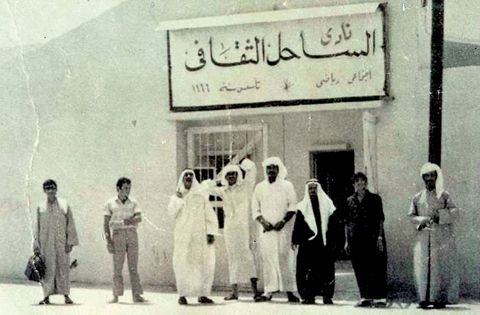 A cultural club in Shuaiba town in 1966
A cultural club in Shuaiba town in 1966KUWAIT: Reminiscing about the past is a unique trait that human beings share as a specie and this process is especially true when it comes to places and areas people used to visit or live in the "good ol'days". The new generation of Kuwaitis perhaps have no prior knowledge on the existence of Al-Shuaiba town, but if one asked an elderly person, he or she might have a clue about the area, which existed prior to 1976.
The town - abandoned some 40 years ago due to proximity to oil installations - was amongst the chief areas in Al-Qsoor region, which includes Fahaheel, Mangaf, Fintas, Funaitees, and Abu Hlaifa. According to researcher Sultan Al-Bahli in his book (Al-Shuaiba Town), people populated the area prior to the spread of Islam. The tribe of Banu Tamim have settled in the region during the era known as the age of Jahiliya (ignorance). Speaking about the modern era of the town, located around
48 kilometers south of Kuwaiti City, historian Adel Al-Sadoun told KUNA that Al-Shuaiba town was founded 1770.
Many famed Kuwaiti families, such as Al-Majdali, Al-Saqer, Al-Sallal, and others, called Al-Shuaiba town their "home", said Al-Sadoun who noted that the name of the area was derived from the waterways resulting from rainfall. Throughout the years, Shuaiba town was mentioned prominently in the writings of Arab and foreign travelers and officials between the 1800s and early 1900s. The most famous person to dwell in the town was Sheikh Jaber Al-Mubarak Al-Sabah who is the son of late Amir and founder of the modern Kuwaiti State, Sheikh Mubarak Al-Sabah, also known as Mubarak Al-Kabeer (Mubarak the Great).
The first chief of the town was Mohammad Al-Gassab whose name was mentioned in an official correspondence between Sheikh Mubarak and Major-General Sir Percy Zachariah Cox, a British Indian Army officer and Colonial Office administrator in the Middle East. Before it was abandoned, the population of Al-Shuaiba town reached 10,000 people in 1960; however, locals started to leave town by the mid-1970s, leading to another story about a town lost in history. - KUNA










